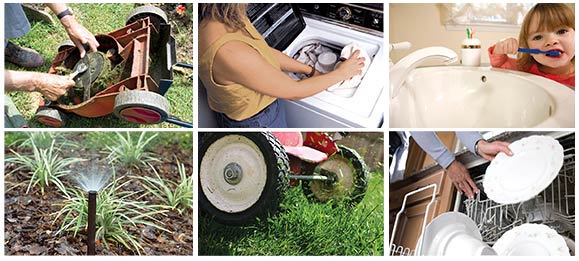
West-central Florida has had an abnormally wet winter and spring, but water conservation is as important as ever. The area is still recovering from a four-year drought, and lake levels are still low. The District’s Governing Board recently extended Modified Phase II water shortage restrictions to help the region in its drought recovery and keep the subject of water conservation on the minds of District residents.
April is Water Conservation Month, a time to start new conservation habits and renew old ones. Here are some tips to conserve water both indoors and outdoors:
- Flush less — remember the toilet is not an ashtray or wastebasket.
- While brushing teeth, shaving, etc., turn off the water.
- Take shorter showers — 5 minutes or less.
- Operate the dishwasher only when you have a full load.
- Scrape, don’t rinse, your dishes before loading in the dishwasher.
- Use your garbage disposal sparingly and start composting your kitchen waste.
- Thaw frozen food in the refrigerator or microwave, not under running water.
- When washing dishes by hand, fill one sink or basin with soapy water and fill the rinsing sink to one-third or one-half full — avoid letting the water run continuously in the rinsing sink.
- Use the shortest wash cycle for lightly soiled loads; normal and permanent press wash cycles use more water.
- Never put water down the drain when there may be another use for it, such as watering a plant or cleaning.
- Replace leaky drain plugs in sinks and bathtubs.
- Seek the leak! Even a small leak can waste 300 or more gallons of water per month.
- Know and follow your local watering restrictions, but don’t water just because it’s your day. Irrigate your lawn when it shows signs of stress from lack of water.
- Water during the cool, early morning hours to minimize water loss by evaporation and to discourage disease. Avoid watering on windy days.
- Cut your grass at the highest recommended height for your turf species, or the highest setting on your lawn mower.
- Keep mower blades sharp. Dull blades tear grass, opening it to disease, and cause it to appear tan and ragged.
- Leave short grass clippings where they fall, reducing the lawn’s need for water and fertilizer.
- Remove thick patches of clippings so that the clippings will not kill the grass underneath.
- Use a kitchen timer to remind yourself to turn off sprinklers.
- Water slowly to reduce runoff and to allow deep penetration.
- Use a rain barrel to collect rainwater. Rainwater is free and is better for your plants because it doesn’t contain hard minerals.
- Use a commercial car wash that recycles water. If you wash your own car, park on the grass, use a bucket of soapy water and use a hose with a shutoff nozzle.
- Cover your spa or pool to reduce evaporation.
For more information on how to conserve water, visit the District’s web site at WaterMatters.org/conservation/.
